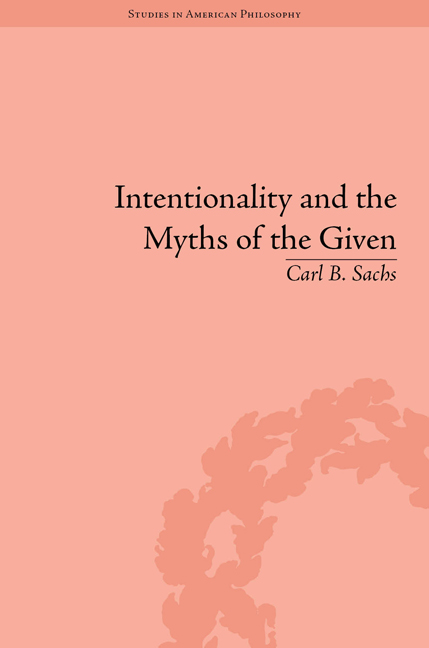Book contents
- Frontmatter
- Contents
- Acknowledgements
- Introduction: Why a New Account of Intentionality?
- 1 Intentionality and the Problem of Transcendental Friction
- 2 The Epistemic Given and the Semantic Given in C. I. Lewis
- 3 Discursive Intentionality and ‘Nonconceptual Content’ in Sellars
- 4 The Retreat from Nonconceptualism: Discourse and Experience in Brandom and McDowell
- 5 Somatic Intentionality and Habitual Normativity in Merleau-Ponty's Account of Lived Embodiment
- 6 The Possibilities and Problems of Bifurcated Intentionality
- Conclusion
- Appendix: Is Phenomenology Committed to the Myth of the Given?
- Works Cited
- Notes
- Index
Appendix: Is Phenomenology Committed to the Myth of the Given?
- Frontmatter
- Contents
- Acknowledgements
- Introduction: Why a New Account of Intentionality?
- 1 Intentionality and the Problem of Transcendental Friction
- 2 The Epistemic Given and the Semantic Given in C. I. Lewis
- 3 Discursive Intentionality and ‘Nonconceptual Content’ in Sellars
- 4 The Retreat from Nonconceptualism: Discourse and Experience in Brandom and McDowell
- 5 Somatic Intentionality and Habitual Normativity in Merleau-Ponty's Account of Lived Embodiment
- 6 The Possibilities and Problems of Bifurcated Intentionality
- Conclusion
- Appendix: Is Phenomenology Committed to the Myth of the Given?
- Works Cited
- Notes
- Index
Summary
In Chapter 1, I noted that the Myth of the Given is often treated as having a fairly narrow scope, as if it were a problem only for empiricist theories of knowledge. Considerably less attention has been given to Sellars's insistence on rejecting ‘the entire framework of givenness’ that must be rejected, and along with it, any attempt to ground a language-game outside of all language-games. When the Myth of the Given is understood in such broad terms, however, we must inquire into whether or not phenomenology is a version of the Myth. Brassier correctly notes that ‘empiricism and Cartesianism are not the only tributaries of the myth of the given’ and thereby raises the challenge that ‘[t]he claim that meaning is rooted in the originary ‘sense-bestowing’ acts of consciousness renders phenomenology, at least its transcendental variants, directly subservient to the myth’. In the terms I use here to characterize the Myth of the semantic Given, Brassier is correct to claim that phenomenology is a version of the Myth if phenomenology holds that epistemic and semantic roles can be constituted independently of, and prior to, language or any other kind of conceptual consciousness. Here I shall argue that, while this does indeed appear to be true of Husserl, it is not true of Merleau-Ponty. However, Merleau-Ponty's rejection of the phenomenological version of the Myth does not depend on abandoning transcendental phenomenology, but rather on the dialectical relation between transcendental phenomenology and empirical psychology.
- Type
- Chapter
- Information
- Intentionality and Myths of the GivenBetween Pragmatism and Phenomenology, pp. 157 - 168Publisher: Pickering & ChattoFirst published in: 2014



